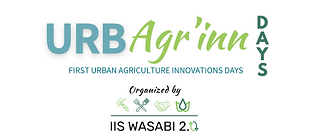
.png)
RESOURCE SMART-FARMING
(organized by H. Jijakli and V. Arcas Pilz)
Innovative solutions for optimizing resource use in urban food production
Urban agriculture, the practice of cultivating, processing, and distributing food within city limits, has become a vital response to the challenges of modern urbanization. With rapid population growth and increasing environmental concerns, cities are exploring innovative ways to ensure food security, reduce carbon footprints, and reconnect communities with the origins of their food. From rooftop gardens and vertical farms to community plots and hydroponic systems, urban agriculture is transforming urban landscapes. However, it is important that urban agriculture prioritizes sustainable and resilient innovations to tackle the pressing global challenges outlined by Johan Rockström's nine planetary boundaries. Technologies such as vertical farming, aquaponics, and closed-loop systems should be designed to minimize environmental impact. Embracing renewable energy sources, circular economy principles, and smart urban planning can help reduce greenhouse gas emissions, and protect biodiversity. Urban agriculture techniques should also reduce freshwater consumption through rainwater harvesting, efficient irrigation methods like drip systems and hydroponics, and greywater recycling. Use and transformation of organic waste should be encourage to create circular nutrient systems.
During the session, the symbiosis with urban ecosystems will be also explored to obtain resources for urban agriculture. Accordingly, this symbiotic strategy emulates natural flows, recovering nutrients, materials, heat and energy from being wasted to act as local supplies for urbans agriculture. With this principle, urban agriculture could act as a link to increase urban circularity and optimize waste management strategies, as well as avoid increasing the environmental burden of local agricultural production with the demand and use of external or imported resources. This session aims to engage researchers and key societal actors in a collaborative dialogue to explore the uses of city resources and scale up successful models.
Withing this session existing methodologies will be introduced for the determination of material flows and environmental footprints, with existing case studies thanks to the following workshop: will be organized as follows :
1. Methodologies for the determination of sustainability (MFA, LCA) applied for urban agriculture.
1.1 Overview of applied methods in current research (MFA, Nutrient balance, LCA):
-
City scale – Building scale MFA. : Short presentation of current work to understand the city and building flows of potential resources
-
Crop scale nutrient balance : Short presentation on the importance of performing a nutrient balance when analyzing sustainable nutrient alternatives in crop production.
1.2 Basics of LCA:Short presentation on the basics of LCA (ISO methodology)
-
Activity with determination of System boundaries (examples from the FCB project) : Creation of 3 groups, each with one typology of UF, with 10 min to design a System boundary diagram adhering to the proposed standardization.
-
Activity for determination of Functional Unit : Within the same group, generate a list of potential Functional units applied in the LCA depending on the target goal: (1) Production, (2) Economic target, (3) Nutritional target (4) Social target…
2. Barriers in resource smart farming (social perception)
We have a resource efficient alternative, it is sustainable, but will society implement it?
-
Activity for the evaluation of social perception of circular strategies : Short presentation of potential controversy of smart resource farming systems and brainstorming ideas on how to overcome such barriers. (3 groups again, each with one technology?)
Together, we can reimagine urban spaces as hubs of sustainability, resilience, and innovation, contributing to a healthier planet and more equitable societies.
